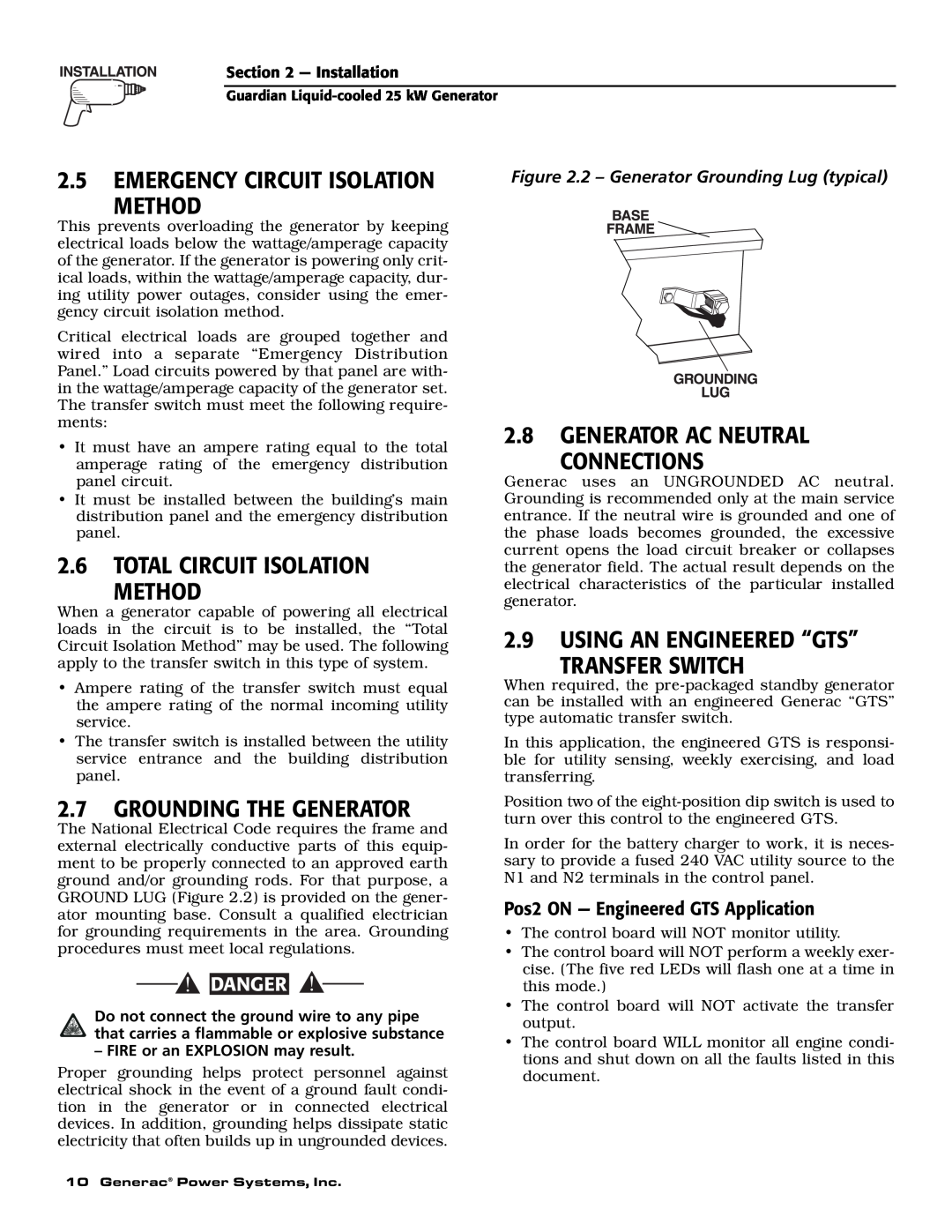
Section 2 — Installation
Guardian
2.5EMERGENCY CIRCUIT ISOLATION
METHOD
This prevents overloading the generator by keeping electrical loads below the wattage/amperage capacity of the generator. If the generator is powering only crit- ical loads, within the wattage/amperage capacity, dur- ing utility power outages, consider using the emer- gency circuit isolation method.
Critical electrical loads are grouped together and wired into a separate “Emergency Distribution Panel.” Load circuits powered by that panel are with- in the wattage/amperage capacity of the generator set. The transfer switch must meet the following require- ments:
•It must have an ampere rating equal to the total amperage rating of the emergency distribution panel circuit.
•It must be installed between the building’s main distribution panel and the emergency distribution panel.
2.6TOTAL CIRCUIT ISOLATION
METHOD
When a generator capable of powering all electrical loads in the circuit is to be installed, the “Total Circuit Isolation Method” may be used. The following apply to the transfer switch in this type of system.
•Ampere rating of the transfer switch must equal the ampere rating of the normal incoming utility service.
•The transfer switch is installed between the utility service entrance and the building distribution panel.
2.7GROUNDING THE GENERATOR
The National Electrical Code requires the frame and external electrically conductive parts of this equip- ment to be properly connected to an approved earth ground and/or grounding rods. For that purpose, a GROUND LUG (Figure 2.2) is provided on the gener- ator mounting base. Consult a qualified electrician for grounding requirements in the area. Grounding procedures must meet local regulations.
![]()
![]() DANGER
DANGER
Do not connect the ground wire to any pipe that carries a flammable or explosive substance
– FIRE or an EXPLOSION may result.
Proper grounding helps protect personnel against electrical shock in the event of a ground fault condi- tion in the generator or in connected electrical devices. In addition, grounding helps dissipate static electricity that often builds up in ungrounded devices.
Figure 2.2 – Generator Grounding Lug (typical)
2.8GENERATOR AC NEUTRAL
CONNECTIONS
Generac uses an UNGROUNDED AC neutral. Grounding is recommended only at the main service entrance. If the neutral wire is grounded and one of the phase loads becomes grounded, the excessive current opens the load circuit breaker or collapses the generator field. The actual result depends on the electrical characteristics of the particular installed generator.
2.9USING AN ENGINEERED “GTS”
TRANSFER SWITCH
When required, the
In this application, the engineered GTS is responsi- ble for utility sensing, weekly exercising, and load transferring.
Position two of the
In order for the battery charger to work, it is neces- sary to provide a fused 240 VAC utility source to the N1 and N2 terminals in the control panel.
Pos2 ON — Engineered GTS Application
•The control board will NOT monitor utility.
•The control board will NOT perform a weekly exer- cise. (The five red LEDs will flash one at a time in this mode.)
•The control board will NOT activate the transfer output.
•The control board WILL monitor all engine condi- tions and shut down on all the faults listed in this document.
10 Generac® Power Systems, Inc.
